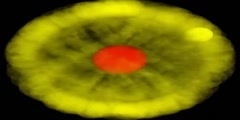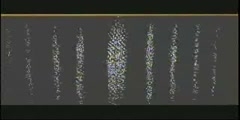Quantum wave functions
A wave function in quantum mechanics is a mathematical object that represents a particular pure quantum state of a specific isolated system of one or more particles. It is a central entity in quantum mechanics. A single wave function describes the entire system, covering at once all the particles in it. For the one state, however, there are many different wave functions, each giving its respective version, or representative[1] description, in a chosen coordinate system. Each of the different representatives encodes all observable items of information about the state, for example the average momentum of a particle, the different versions being mutually interconvertible by one-to-one mathematical transformations. In general, a physical observation of a quantum system in a particular state gives a partly unpredictable result. The wave function, however, encodes probabilities of the possible results, through mathematical operators called observables. Each of the many possible modes of physical observation is encoded by its own mathematical observable. Each such observable generates a representation that encompasses all the possible particular states of the specific system. For a particular state and coordinate system, for each observable there is just one representative wave function.
Channels: Physics (General) Particle physics
Uploaded by: admin ( Send Message ) on 16-03-2016.
Duration: 11m 23s














